Apart from his daily Endeavour journal entries, James Cook wrote descriptions of the places and people he encountered in the course of the voyage and observed:
From what I have said of the Natives of New-Holland they may appear to some to be the most wretched people upon Earth, but in reality they are far more happier than we Europeans; being wholy unacquainted not only with the superfluous but the necessary conveniencies so much sought after in Europe, they are happy in not knowing the use of them. They live in a Tranquillity which is not disturb’d by the Inequality of Condition.
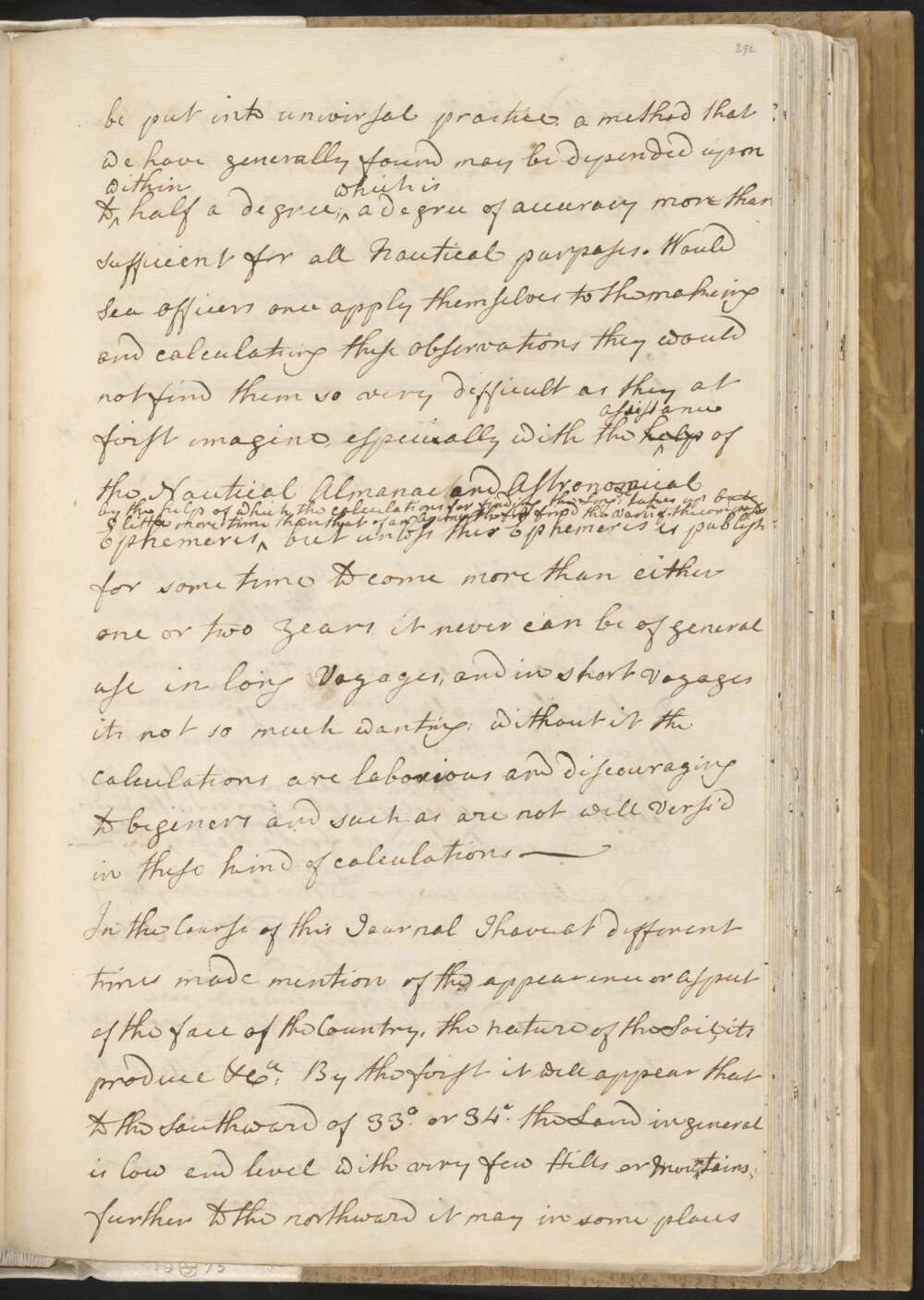
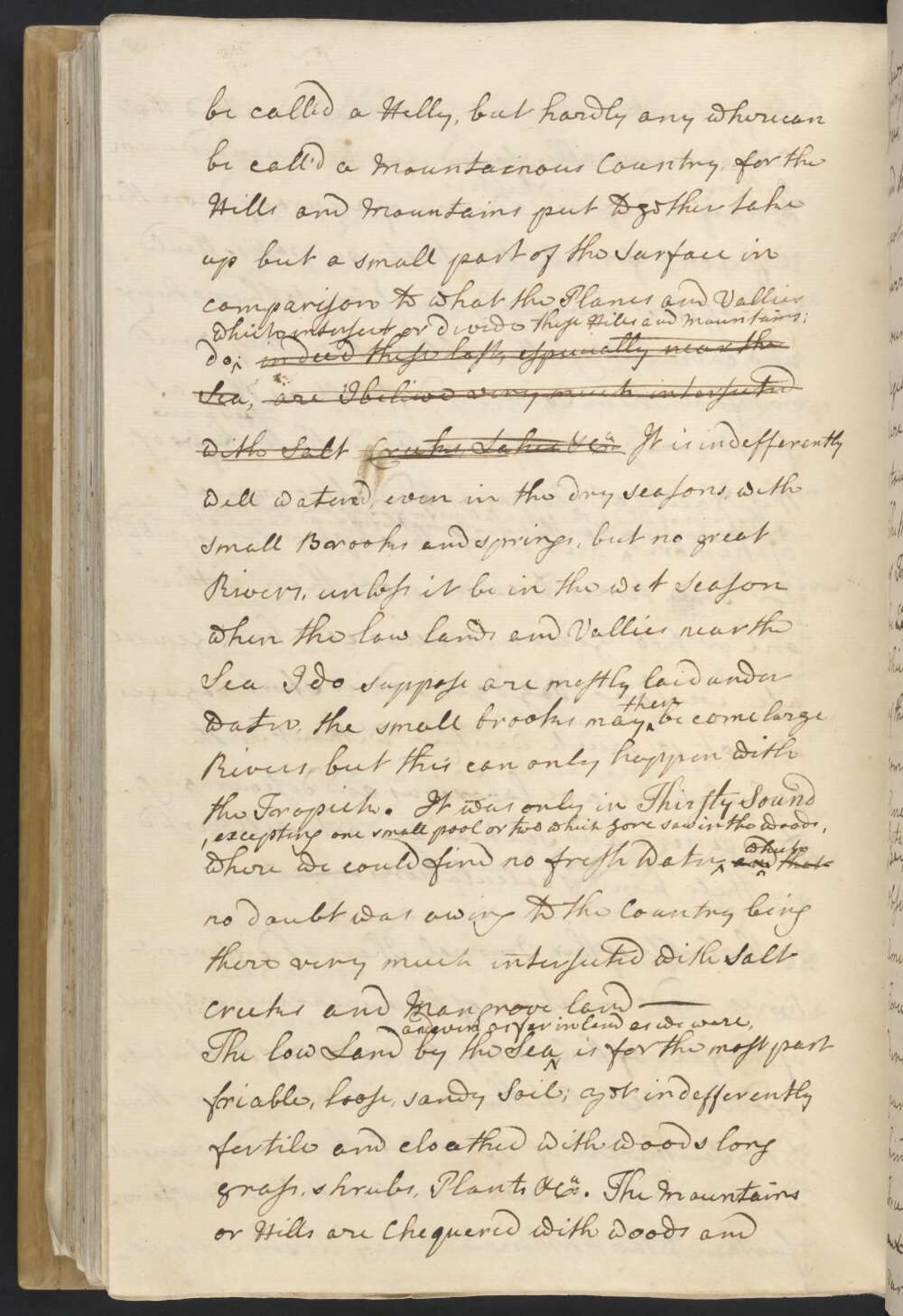
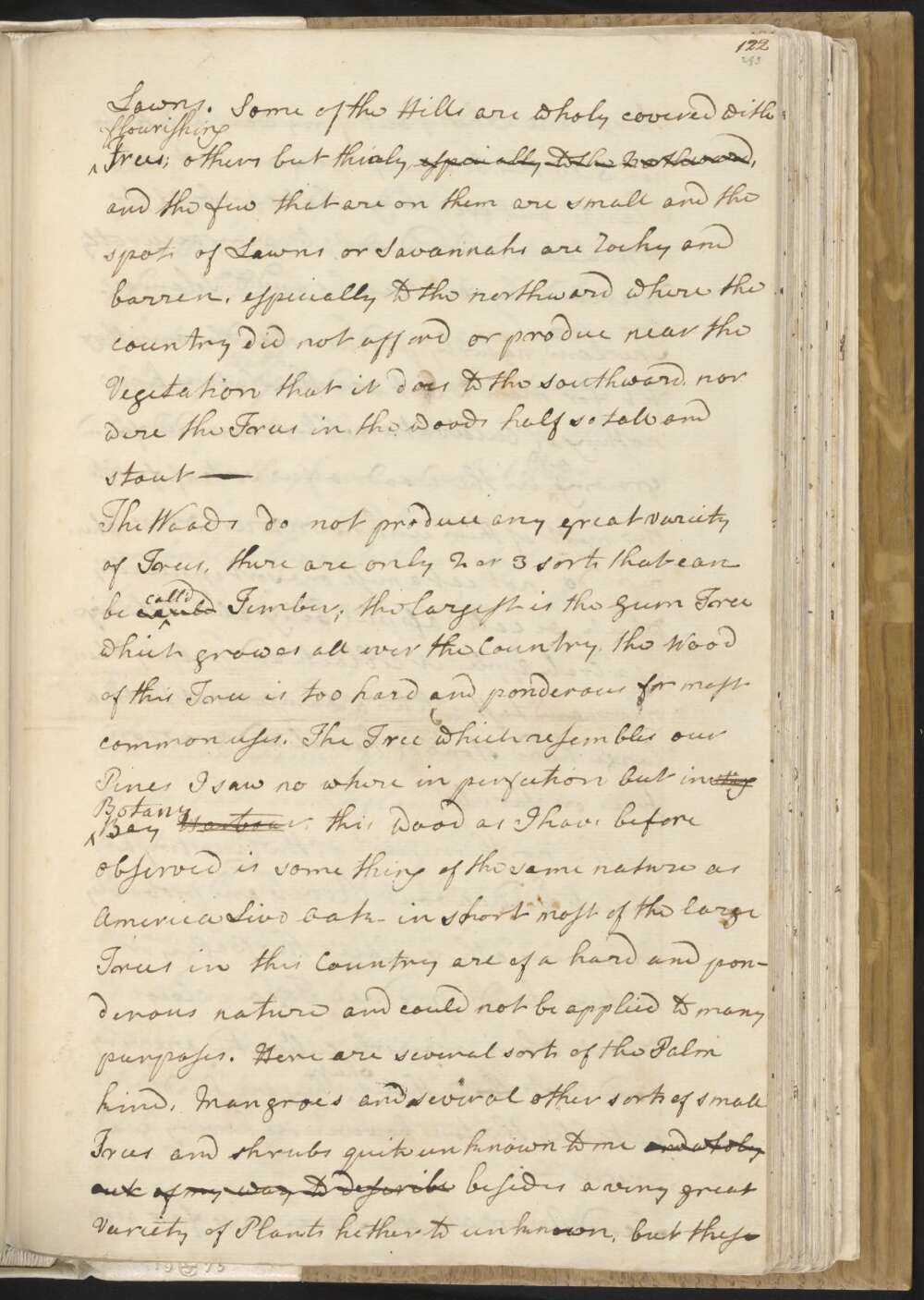
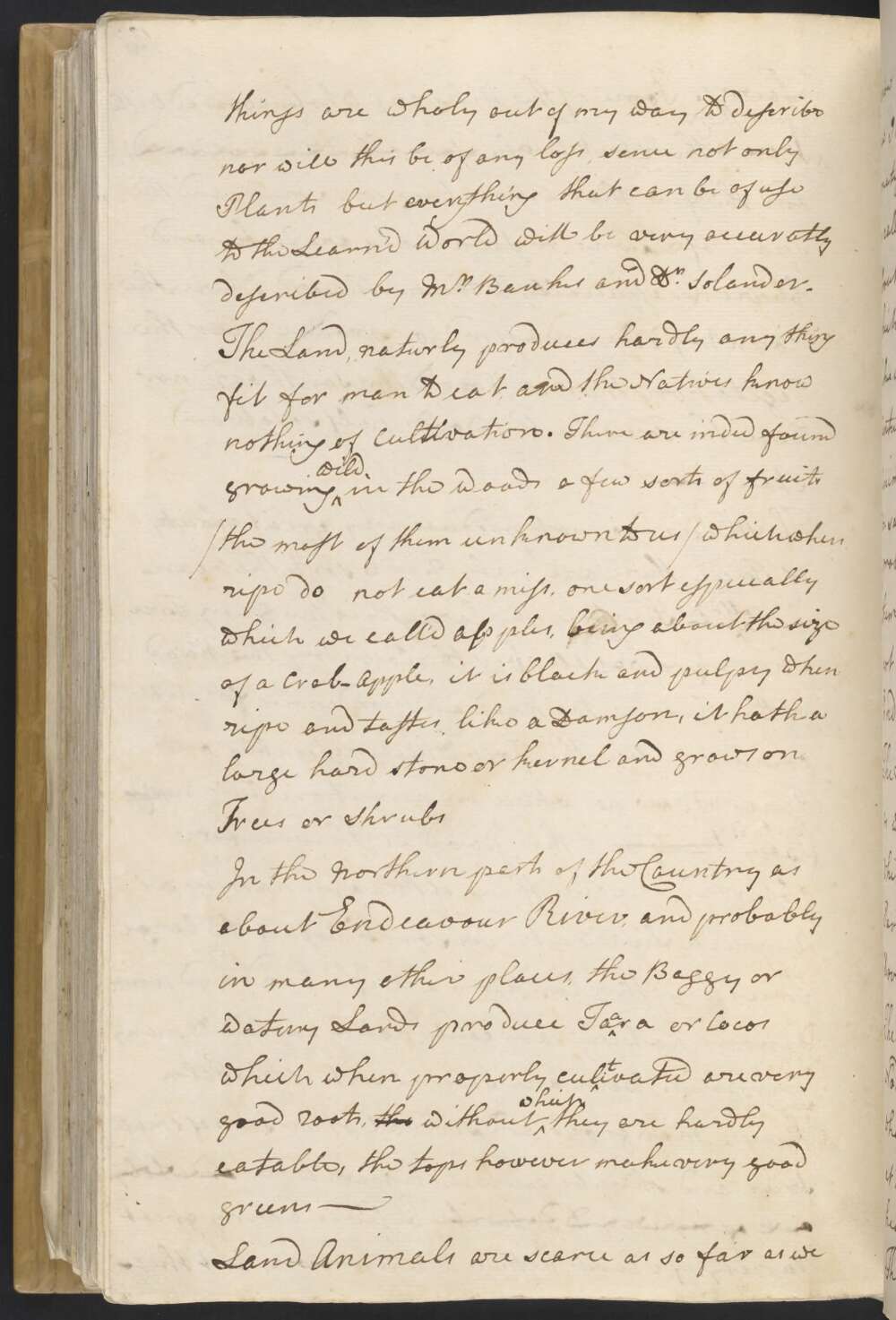
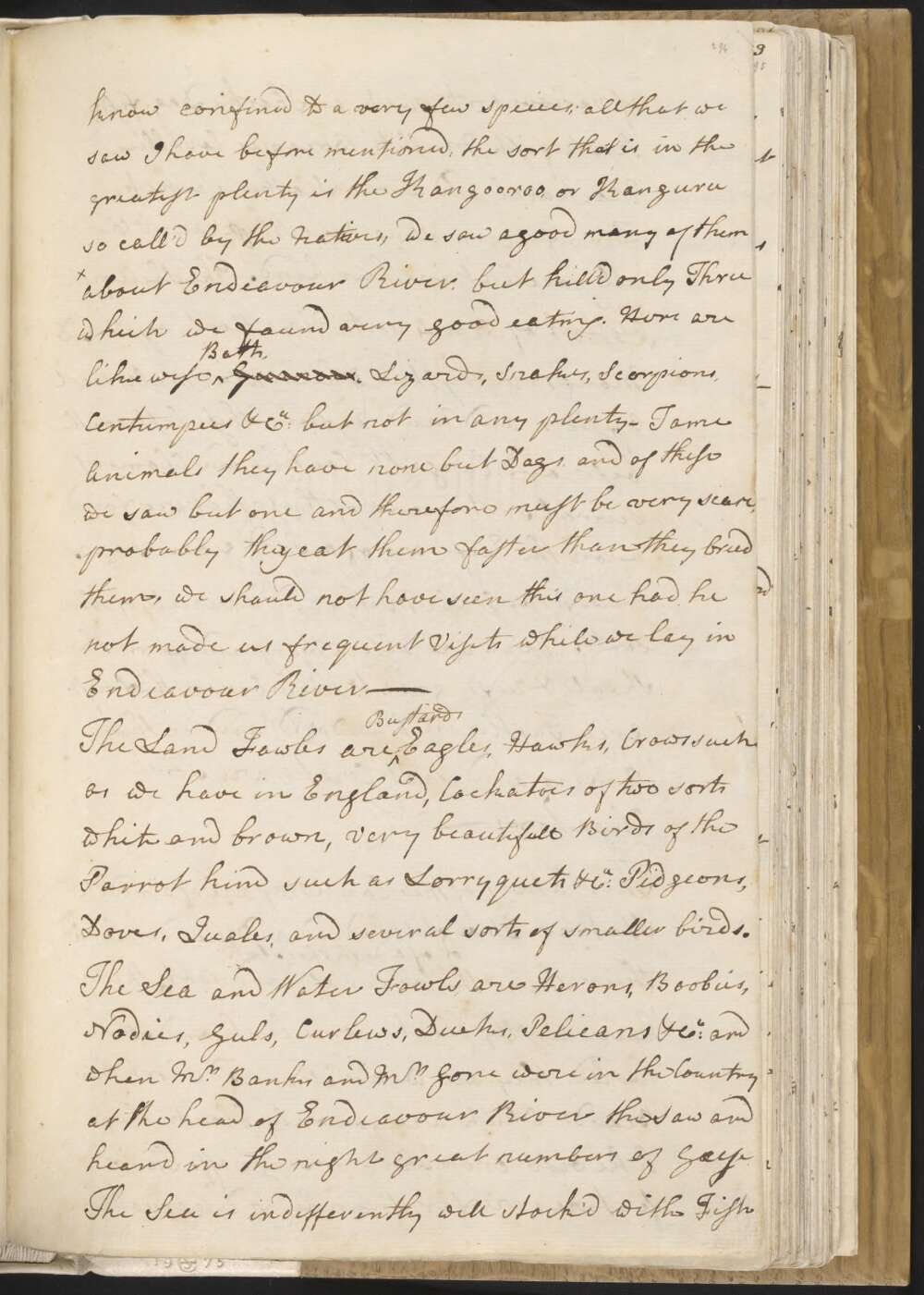
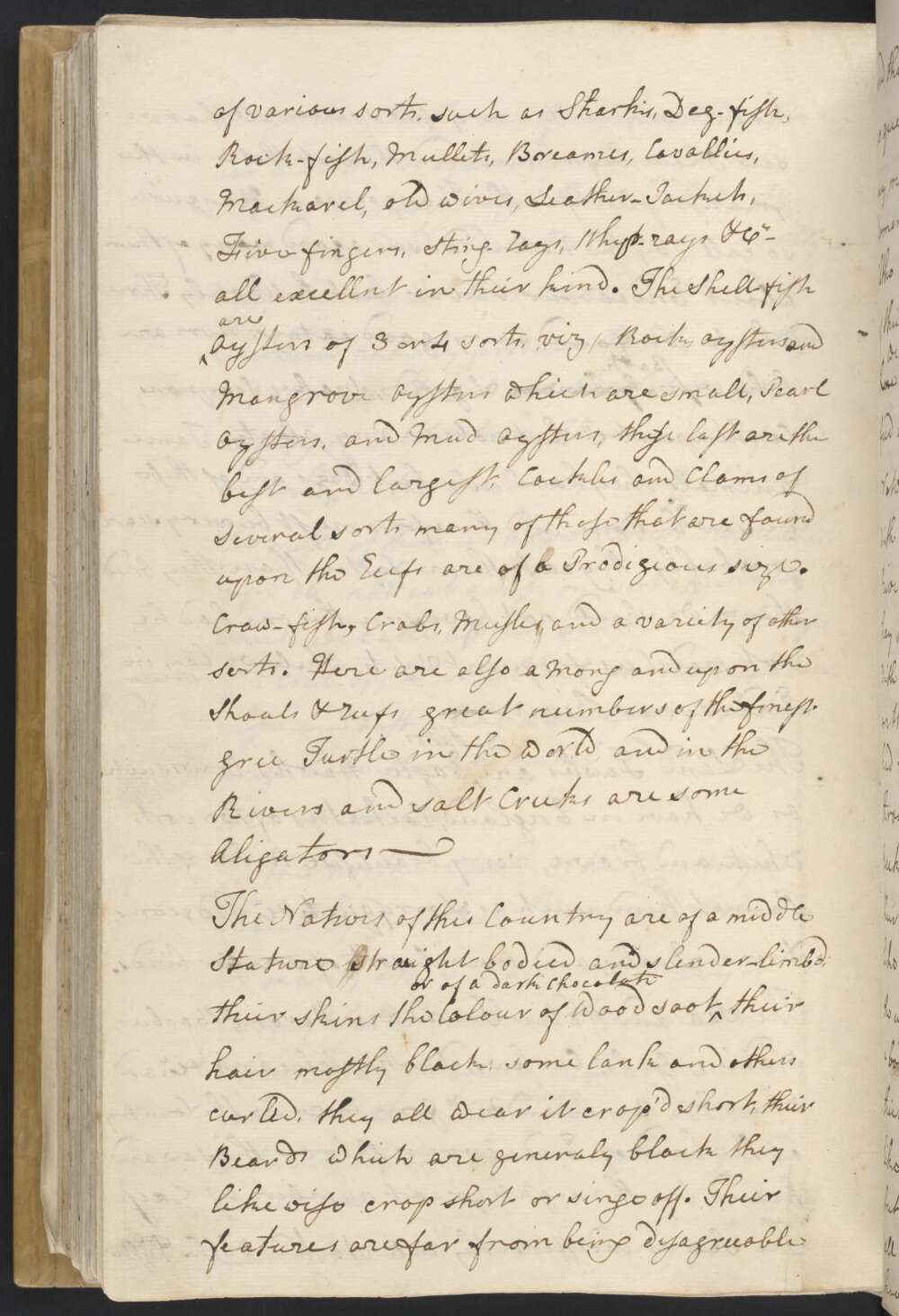
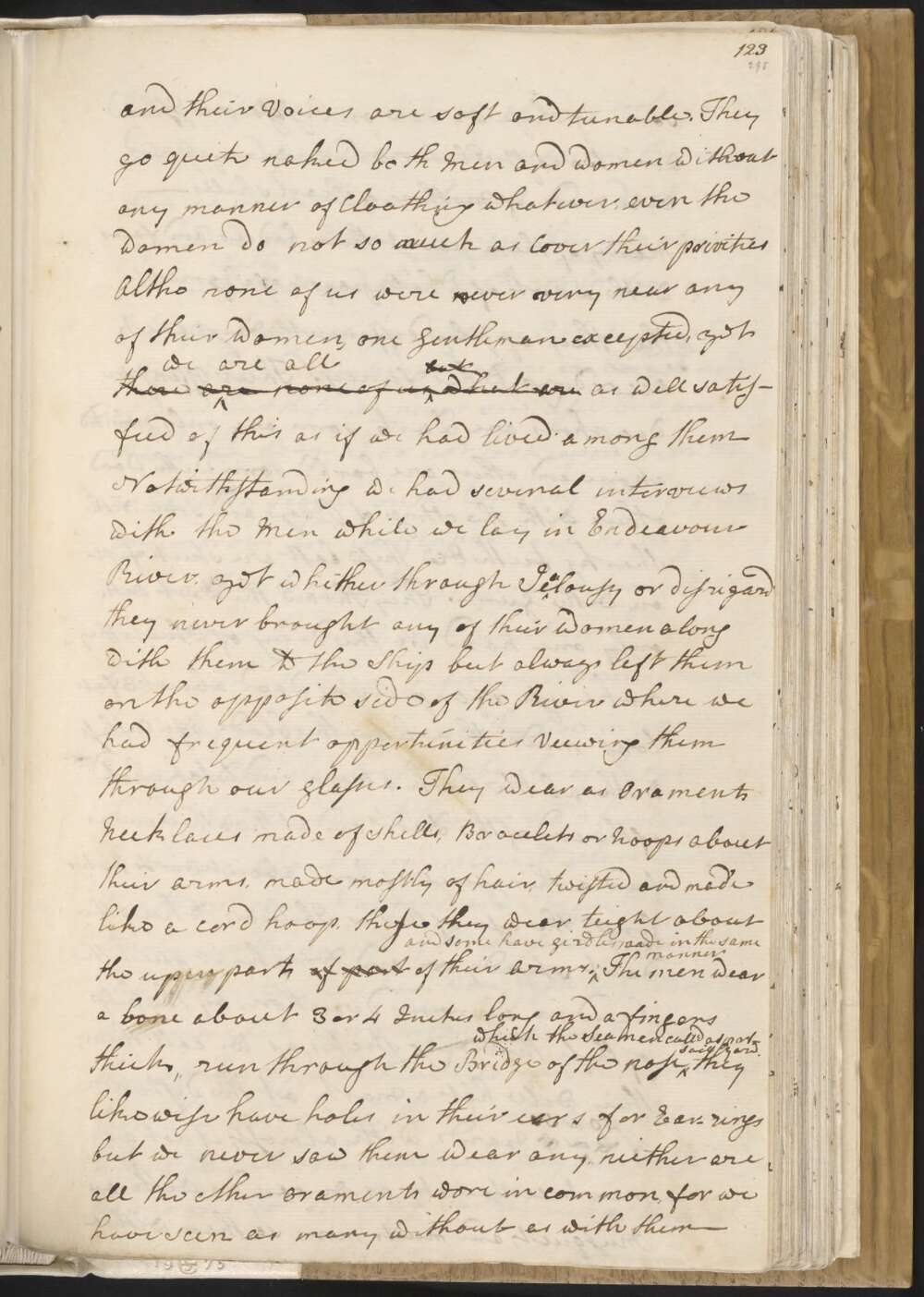
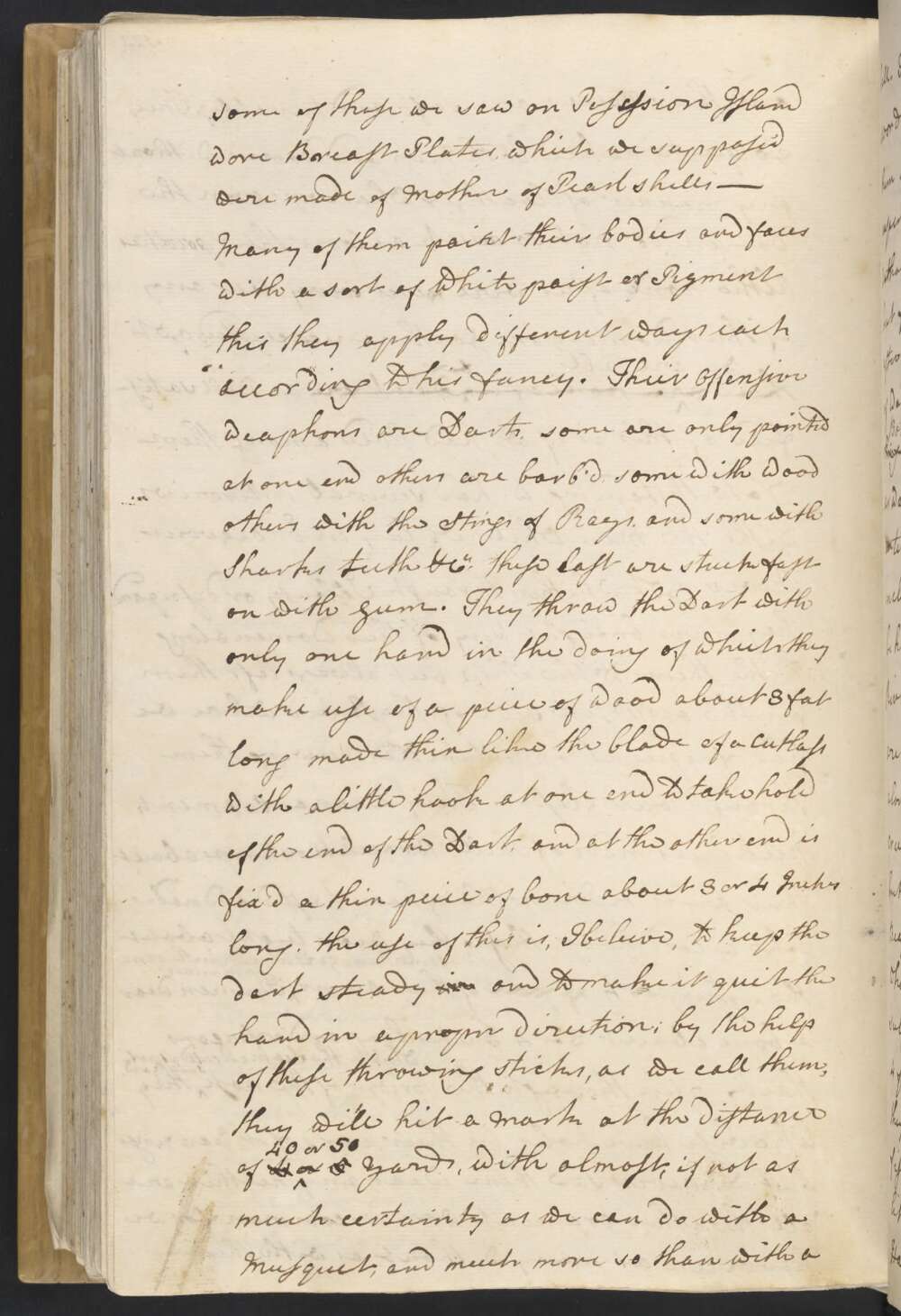
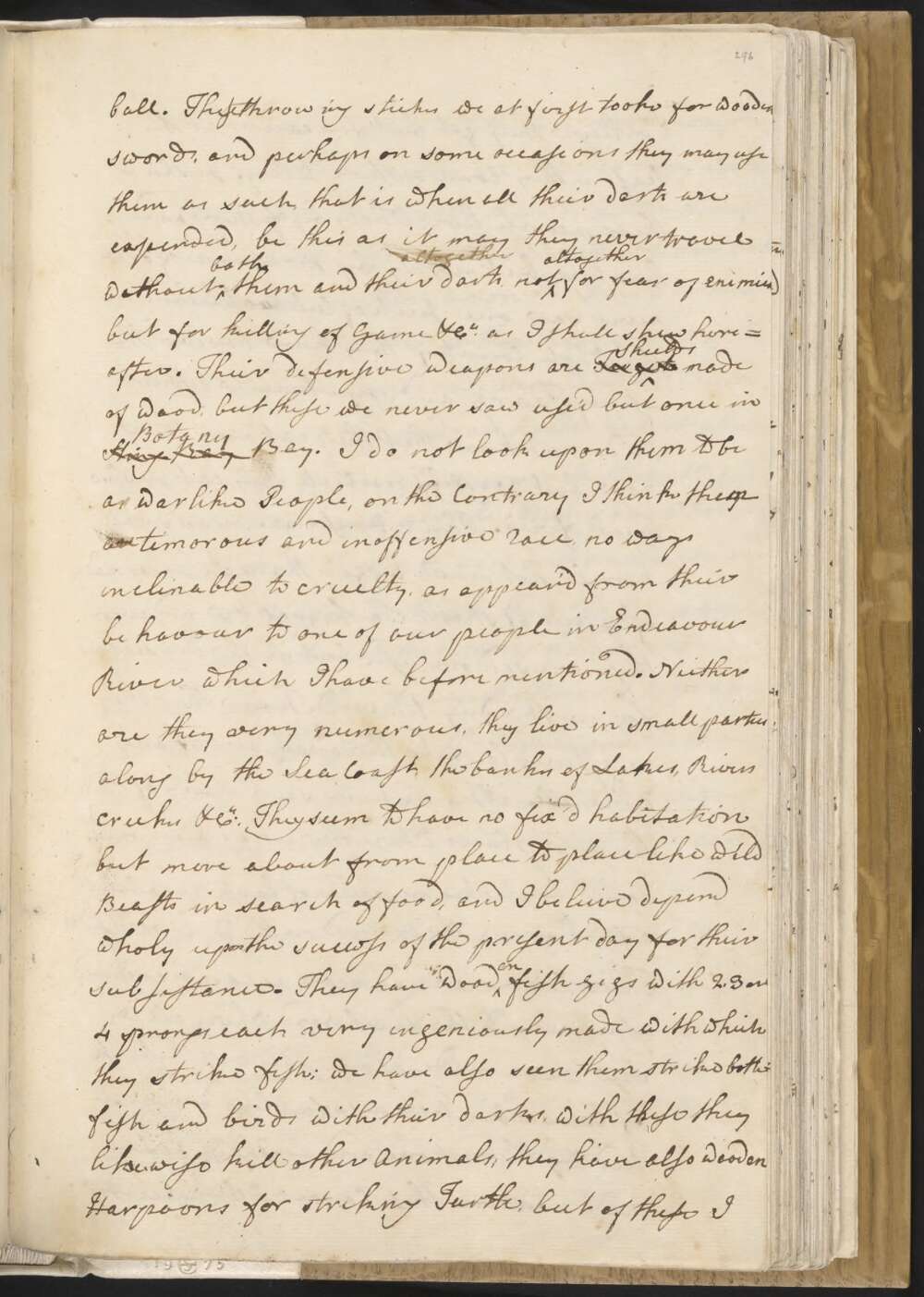
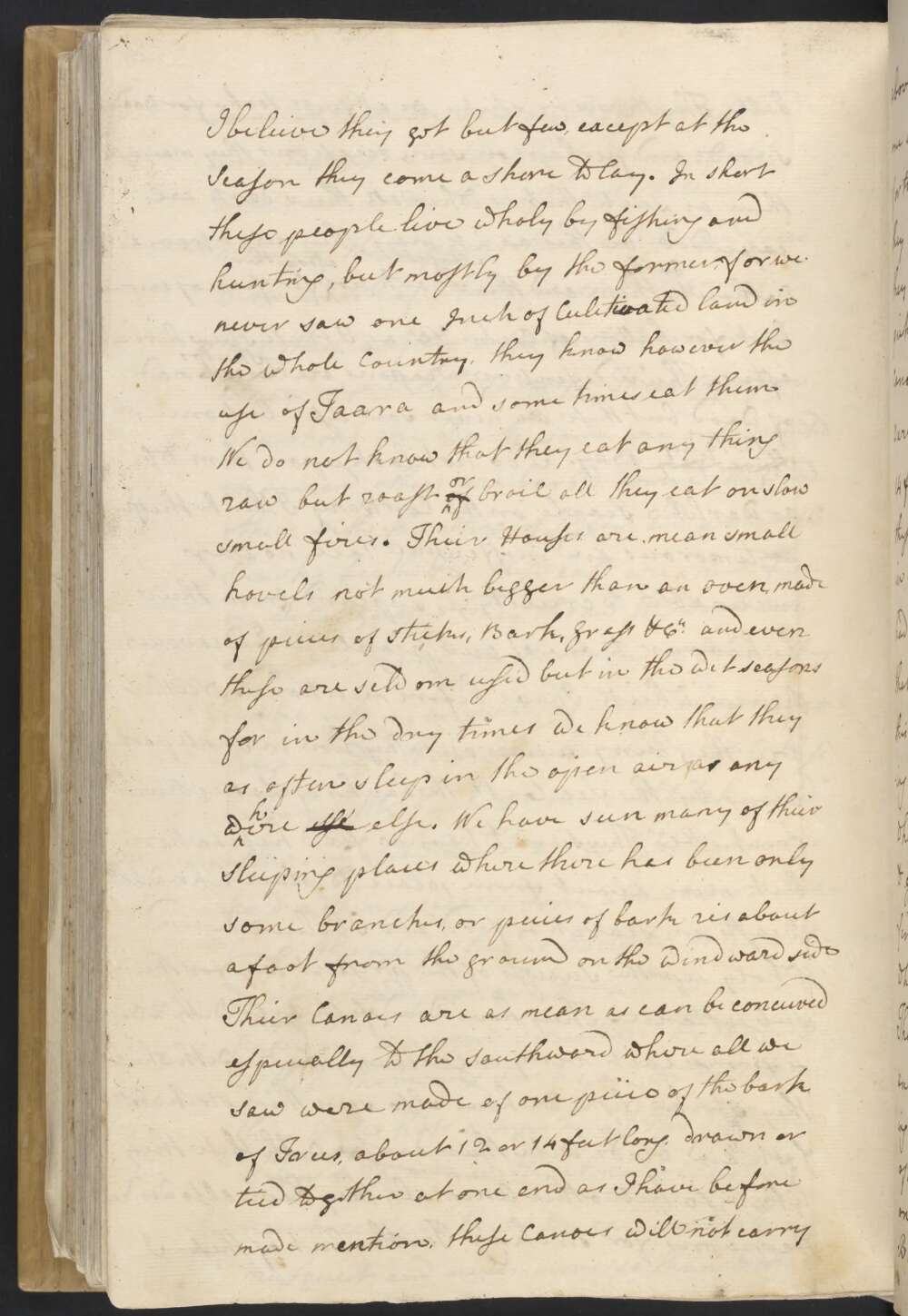
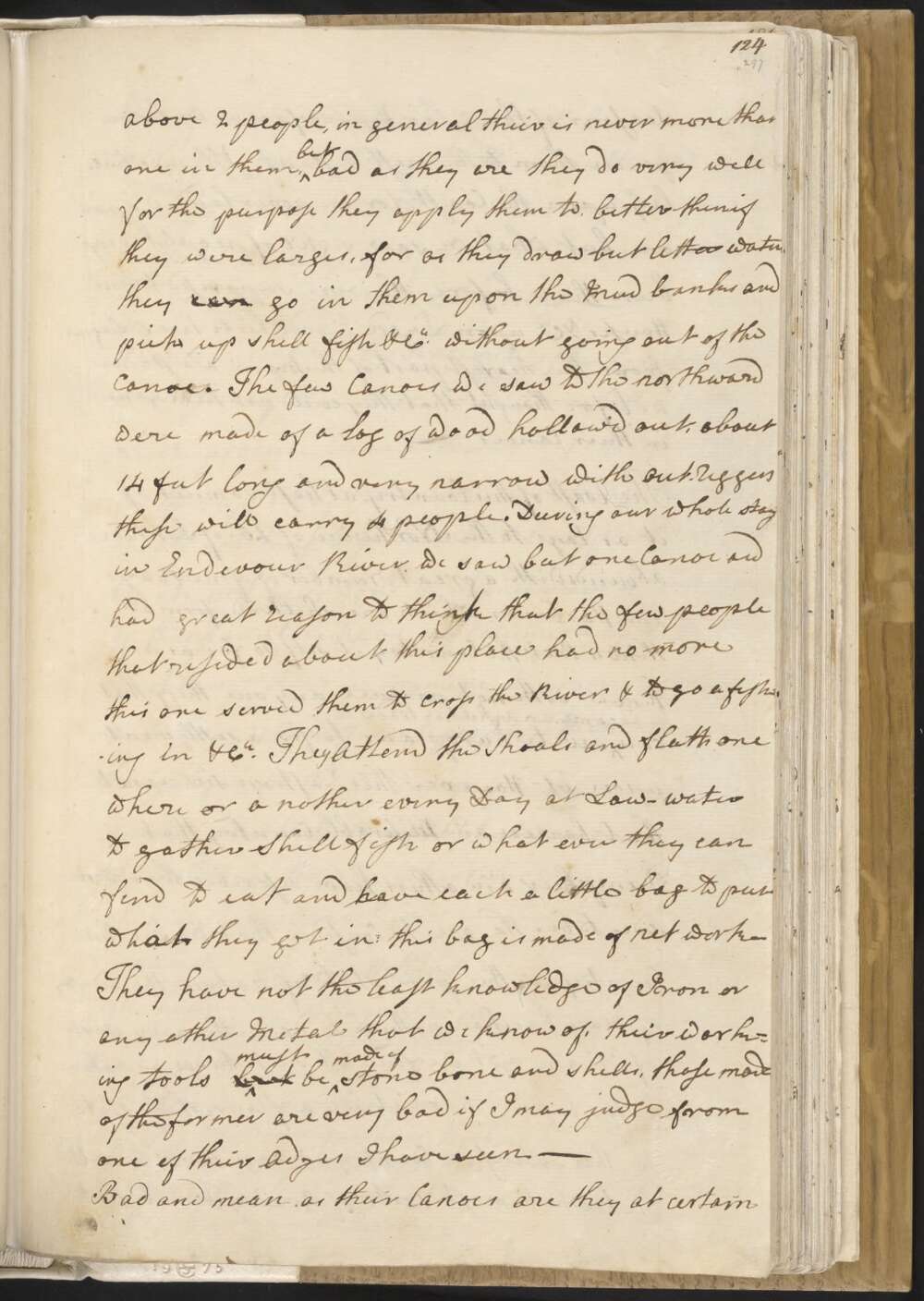
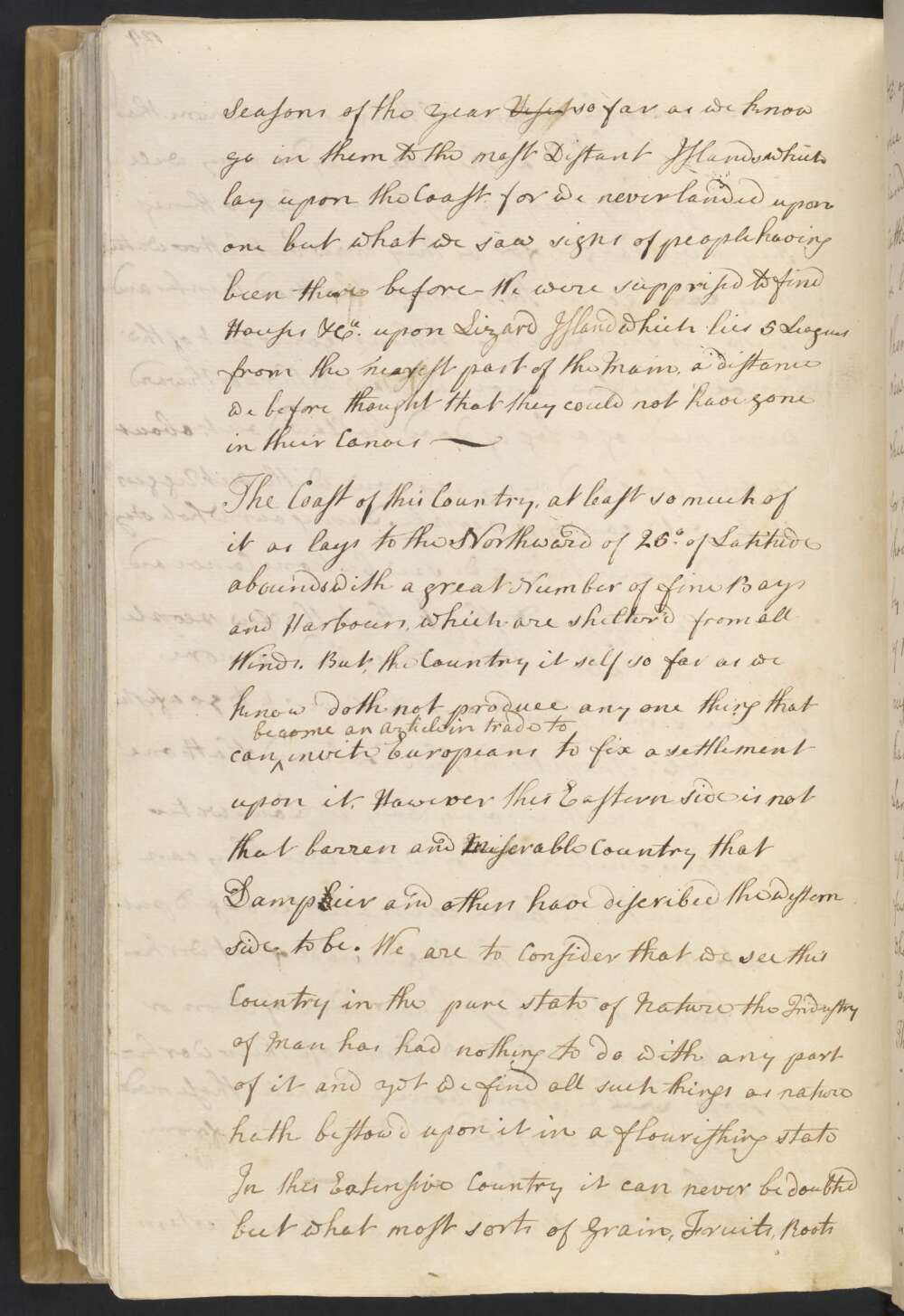
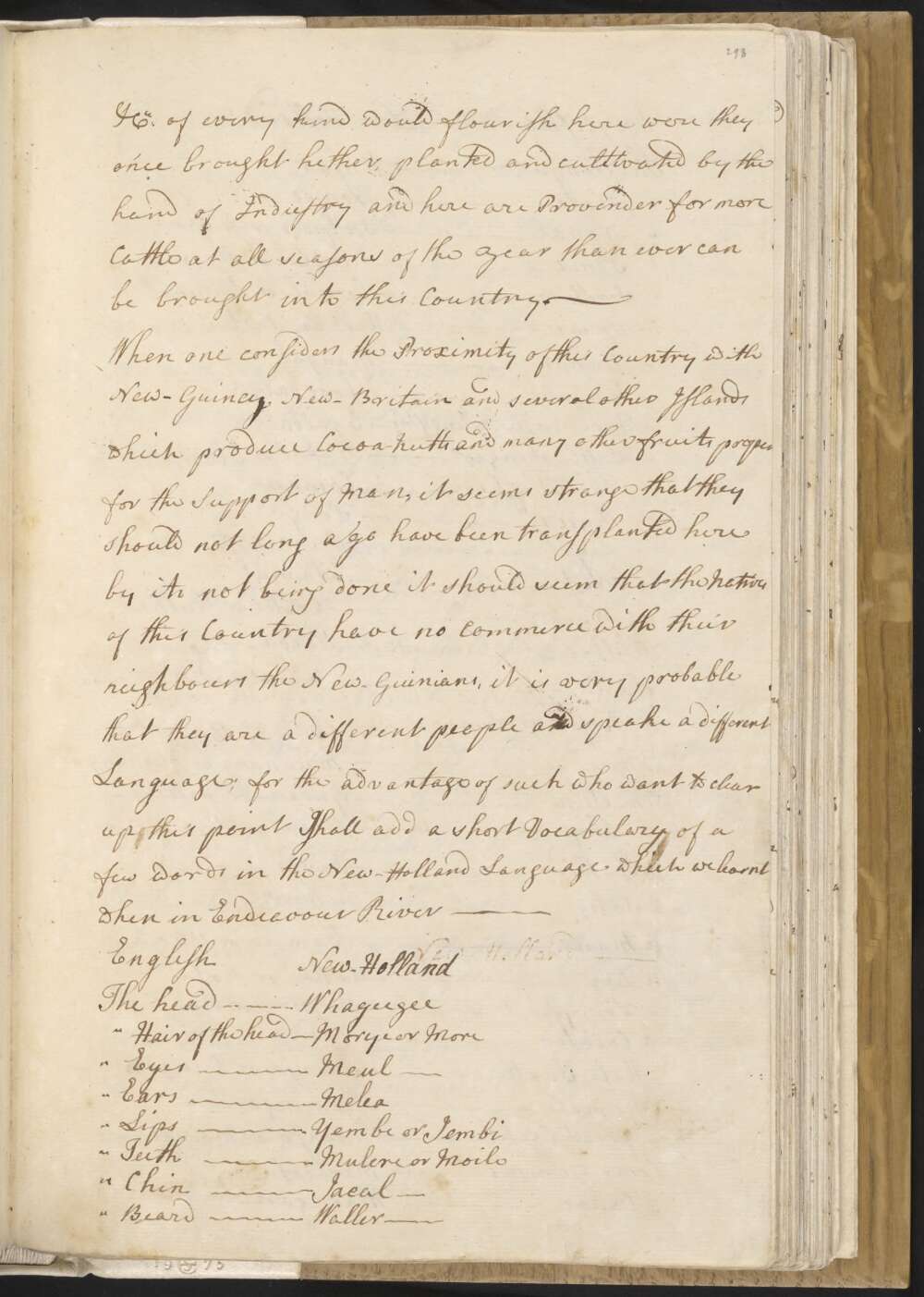
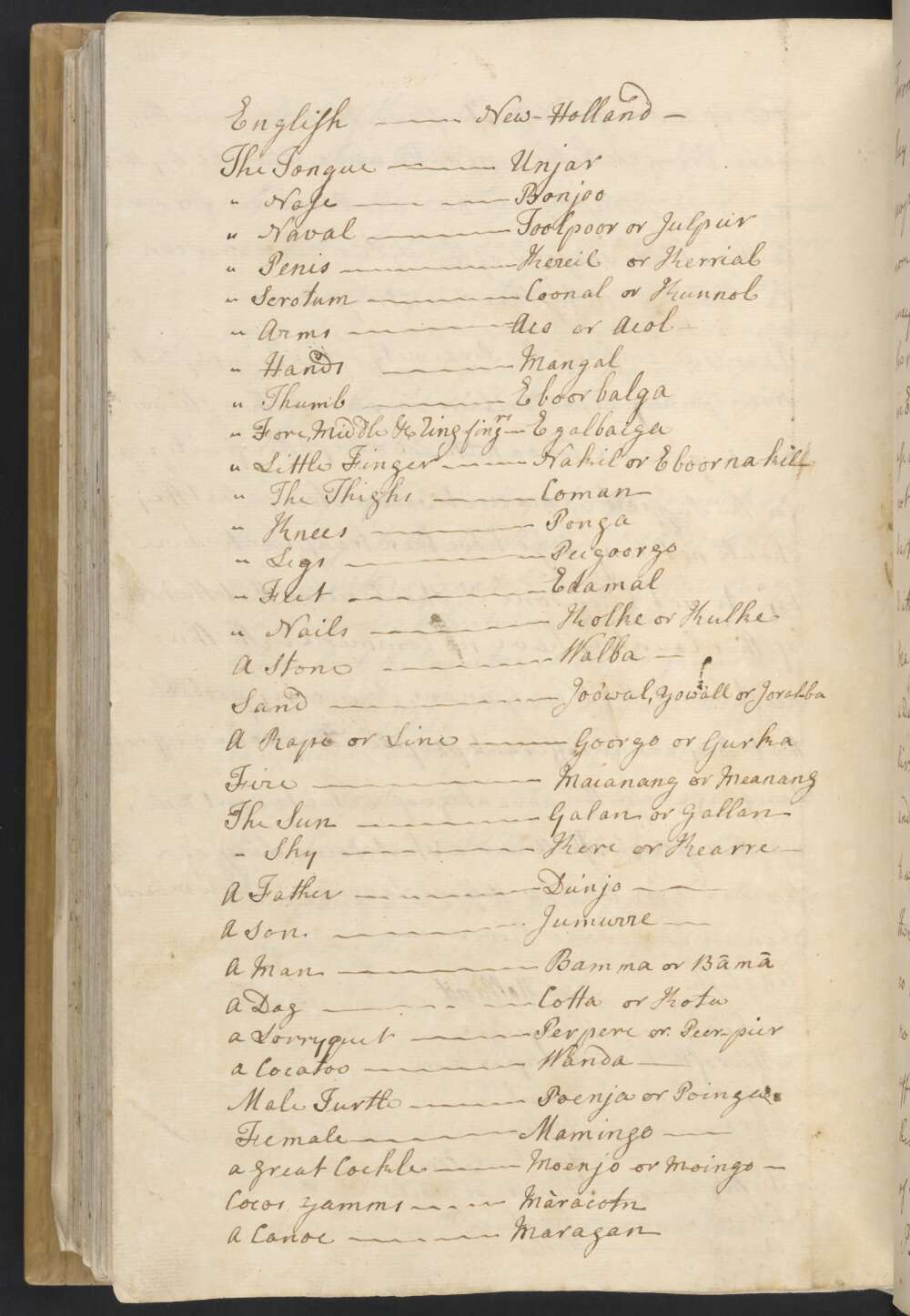
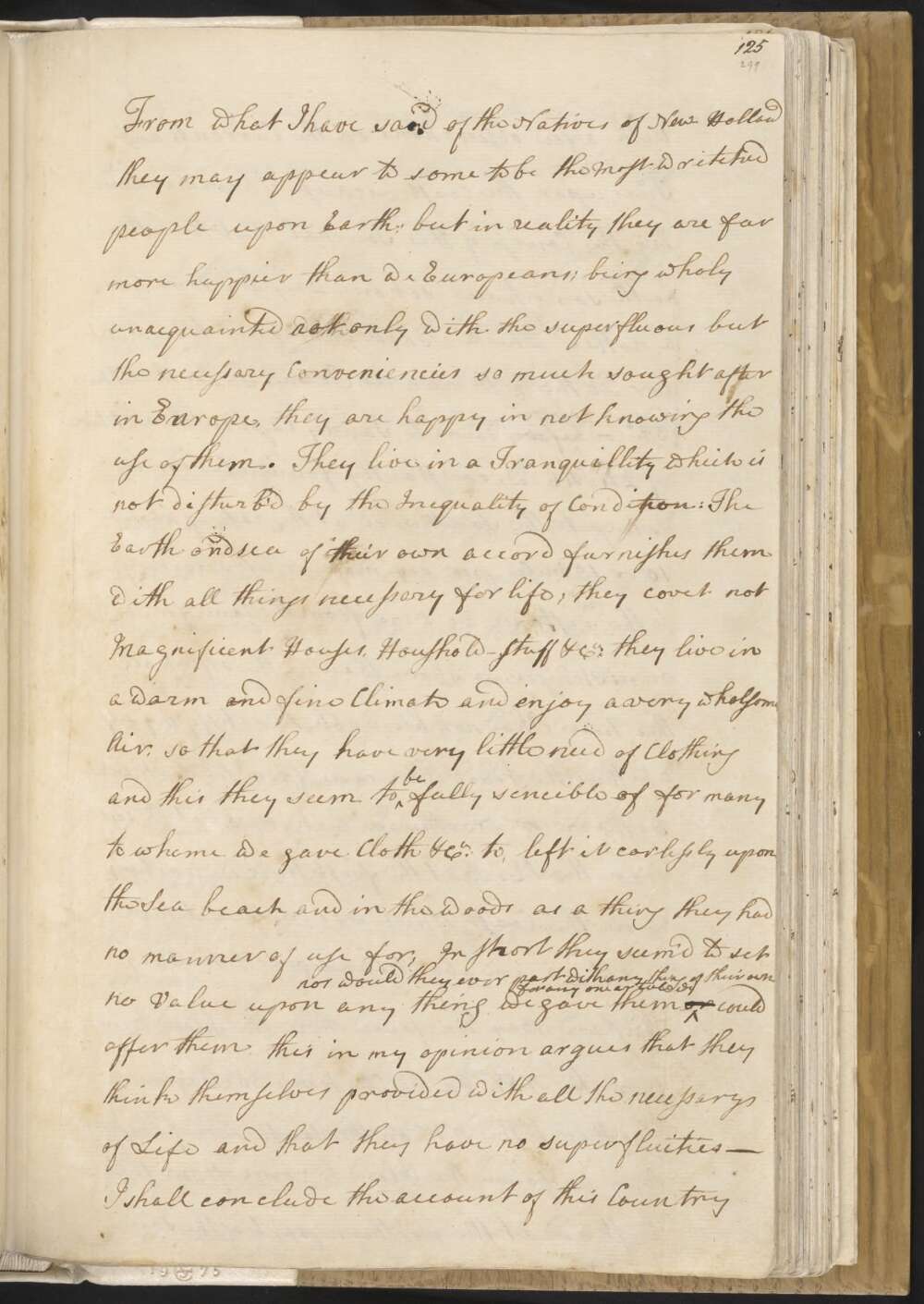
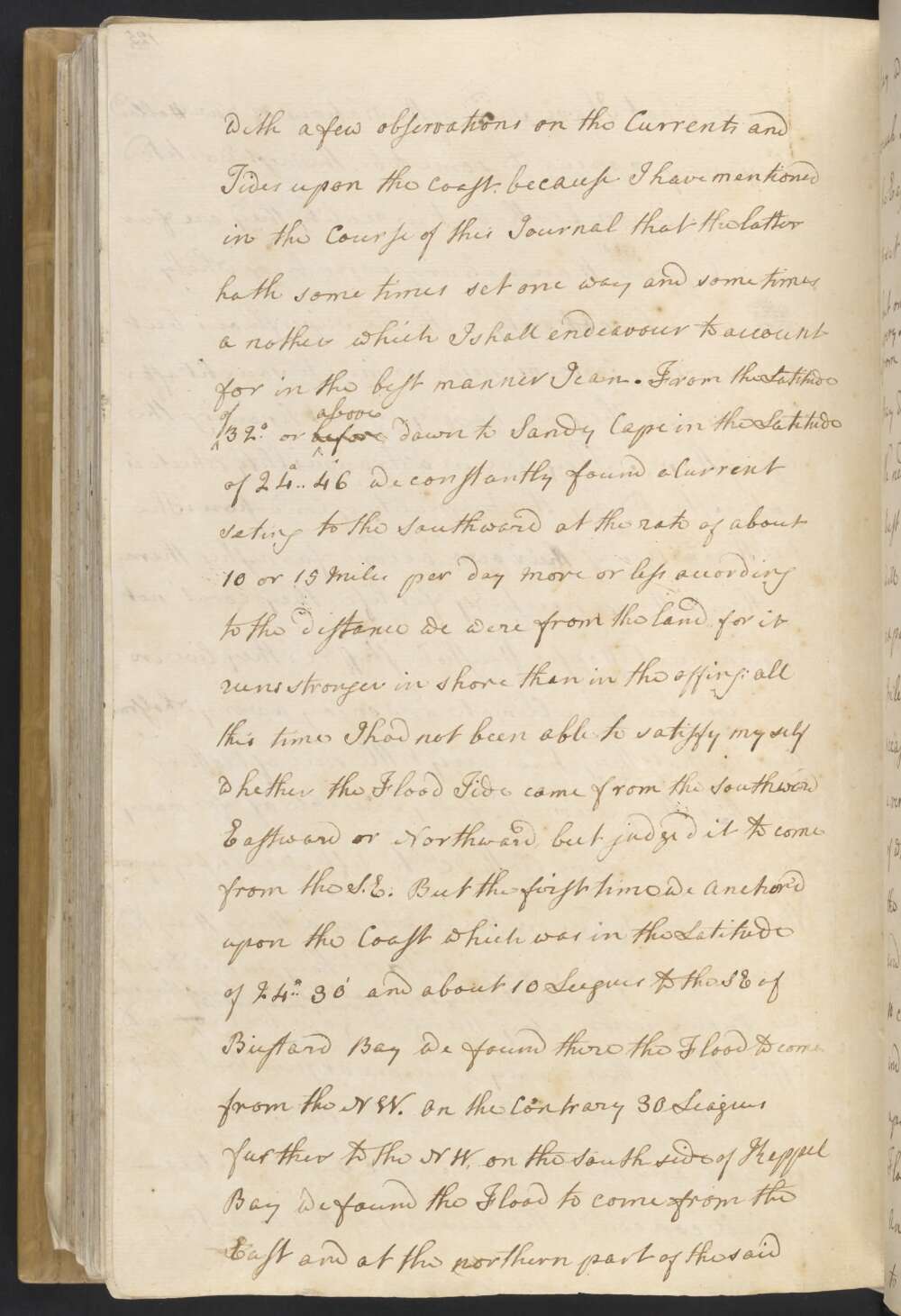
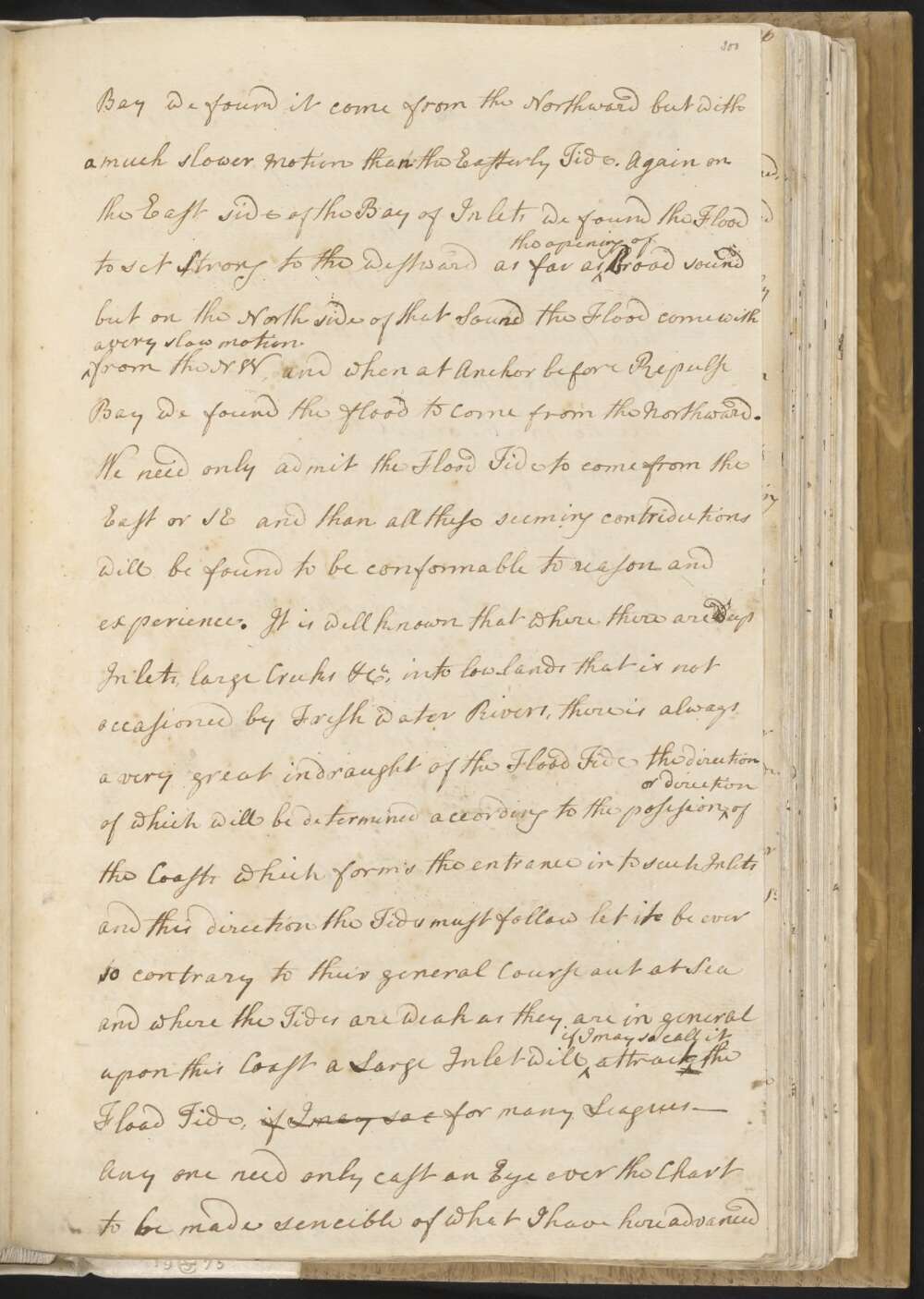
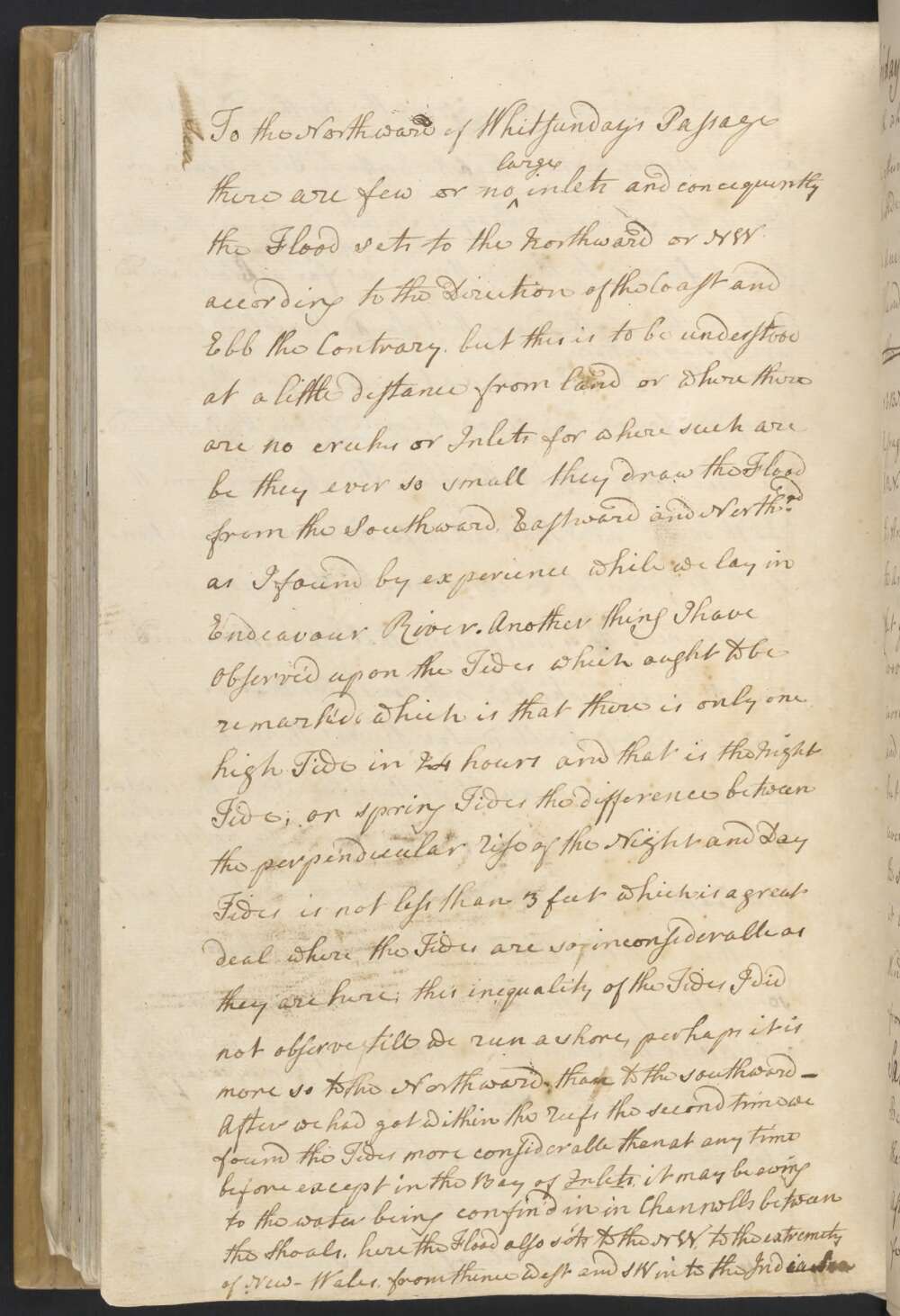
Images and transcripts kindly supplied by the National Library of Australia.
Transcripts
In the Course of this Journal I have at different times made mention of the appearence or Aspect of the face of the Country, the nature of the Soil, its produce &Ca. By the first it will appear that to the Southward of 33° or 34° the Land in general is low and level with very few Hills or Mountains, further to the northward it may in some places be called a Hilly, but hardly any where can be call'd a Mountainous Country, for the Hills and Mountains put together take up but a small part of the Surface in comparison to what the Planes and Vallies do which intersect or divide these Hills and Mountains: indeed these last, especially near the Sea, are I beleive very much interjected with Salt Creeks, Lakes &Ca
It is indefferently well watered, even in the dry Seasons, with small Brooks and springs, but no great Rivers, unless it be in the wet Season when the low lands and Vallies near the Sea I do suppose are mostly laid under water; the small brooks may then become large Rivers but this can only happen with the Tropick. It was only in Thirsty Sound where we could find no fresh Water, excepting one small pool or two which Gore saw in the woods, which no doubt was owing to the Country being there very much intersected with Salt creeks and Mangrove land —
The low land by the Sea and even as far in land as we were, is for the most part friable, loose, sandy Soil; yet indefferently fertile and cloathed with woods, long grass, shrubs, Plants &Ca. The Mountains or Hills are Checquered with woods and Lawns. Some of the Hills are wholy covered with flourishing Trees; others but thinly, especially to the northward and the few that are on them are small and the spots of Lawns or Sav-annahs are Rocky and barren, especially to the northward where the country did not afford or produce near the Vegetation that it does to the southward, nor were the Trees in the woods half so tall and stout —
The woods do not produce any great variety of Trees, there are only 2 or 3 sorts that can be couldcall'd Timber; the largest is the Gum Tree which growes all over the Country, the Wood of this Tree is too hard and ponderous for most common uses. The Tree which resembles our Pines, I saw no where in perfection but in StingBotany Bay Harbour, this wood as I have before observed is some thing of the same nature as America Live Oak; in short most of the large Trees in this Country are of a hard and ponderous nature and could not be applied to many purposes. Here are several sorts of the Palm kind, Mangroe and several other sorts of small Trees and shrubs quite unknown to me and wholy out of my way to describe besides a very great Variety of Plants hetherto unknown, but these things are wholy out of my way to describe, nor will this be of any loss sence not only Plants but everything that can be of use to the Learn'd World will be very accuratly described by Mr Banks and Dr Solander.
The Land naturly produces hardly any thing fit for man to eat and the Natives know nothing of Cultivation. There are indeed growing wild in the wood a few sorts of fruits / the most of them unknown to us / which when ripe do not eat a miss, one sort especially, which we call'd Apples, being about the size of a Crab-Apple; it is black and pulpy when ripe and tastes like a Damson, it hath a large hard stone or kernel and grows on Trees or Shrubs
In the Northern parts of the Country as about Endeavour River, and probably in many other places, the Boggy or watery Lands produce Taa or Cocos which when properly cultivated are very good roots, without which they are hardly eatable, the tops however make very good greens —
Land Animals are scarce, as so far as we know confined to a very few species; all that we saw I have before mentioned, the sort that is in the greatest plenty is the Kangooroo, or Kanguru so call'd by the Natives; we saw a good many of them about Endeavour River, but kill'd only Three which we found very good eating. Here are like wise Batts Guanoes, Lizards, Snakes, Scorpions, Centumpees &Ca but not in any plenty. Tame Animals they have none but Dogs, and of these we saw but one and therefore must be very scarce, probably they eat them faster than they breed them, we should not have seen this one had he not made us frequent Visets while we lay in Endeavour River —
The land Fowles are Bustards, Eagles, Hawks, Crows such as we have in England, Cockatoes of two sorts, white and brown, very beautifull Birds of the Parrot kind such as Lorryquets &Ca Pidgeons, Doves, Quales, and several sorts of smaller birds. The Sea and Water Fowls are Herons, Boobies, Nodies, Guls, Curlews, Ducks, Pelicans &Ca and when Mr Banks and Mr Gore were in the Country at the head of Endeavour River they saw and heard in the night great numbers of Geese.
The sea is indifferently well stock'd with Fish of various sorts, such as Sharks, Dog-fish, Rock-fish, Mullets, Breames, Cavallies, Mackarel, old wives, Leather-Jackets, Five-fingers, Sting-Rays, Whip-rays &Ca — all excellent in their kind. The Shell-fish are Oysters of 3 or 4 sorts, viz Rock oysters and Mangrove Oysters which are small, Pearl Oysters, and Mud Oysters, these last are the best and largest; Cockles and Clams of Several sorts, many of those that are found upon the Reefs are of a prodigious size; Craw-fish, Crabs, Musles, and a variety of other sorts. Here are also among and upon the Shoals & reefs great numbers of the finest Gree Turtle in the world and in the River and salt Creeks are some Aligators —
The Natives of this Country are of a middle Stature straight bodied and slender-limbd, their skins the Colour of Wood soot or of a dark Chocolate, their hair mostly black, some lank and others curled, they all wear it crop'd short, their Beards which are generaly black they like wise crop short or singe off. Their features are far from being disagreeable and their Voices are soft and tunable.
They go quite naked both Men and Women without any manner of Cloathing whatever, even the Women do not so much as cover their privities. Altho none of us was ever very near any of their women, one gentleman excepted, yet those we are all are none of us but what are of us as well satisfied of this as if we had lived among them. Notwithstanding we had several interviews with the Men while we lay in Endeavour River, yet wether through Jealousy or disrigard they never brought any of their women along with them to the Ship, but always left them on the opposite side of the River where we had frequent oppertunities viewing them through our glasses.
They wear as Oraments Necklaces made of shells, Bracelets or hoops about their arms, made mostly of hair twisted and made like a cord hoop, these they wear teight about the uper parts part of their Arms, and some have girdles made in the same manner The men wear a bone about 3 or 4 Inches long and a fingers thick, run through the Bridget of the nose which the Seamen call'd a sprit sail yard. they like wise have holes in their ears for Earrings, but we never saw them wear any, neither are all the other oraments wore in common for we have seen as many without as with them — some of these we saw on Posession Island wore Breast Plates which we suppose'd were made of Mother of Pearl shells —
Many of them paint their bodies and faces with a sort of White paist or Pigment, this they apply different ways each according to his fancy.
Their Offensive weaphons are Darts, some are only pointed at one end others are barb'd, some with wood others with the Stings of Rays and some with Sharks teeth &Ca, these last are stuck fast on with gum. They throw the Dart with only one hand, in the doing of which they make use of a peice of wood about 3 feet long, made thin like the blade of a Cutlass, with a little hook at one end to take hold of the end of the Dart, and at the other end is fix'd a thin peice of bone about 3 or 4 Inches long; the use of this is, I beleive, to keep the dart steady and to make it quit the hand in a proper direction; by the help of these throwing sticks, as we call them, they will hit a Mark at the distance of 4 or 5 40 or 50 Yards, with almost, if not as much certainty as we can do with a Musquet, and much more so than with a ball.
These throwing sticks we at first took for wooden swords, and perhaps on some occasions they may use them as such, that is when all their darts are expended, be this as it may they never travel without both them and their darts, not altogether for fear of enimies but for killing of Game &Ca as I shall shew hereafter. Their defensive weapons are Shields made of wood but these we never saw use'd but once in Sting Ray Botany Bay.
I do not look upon them to be a warlike People, on the Contrary I think theym am timorous and inoffensive race, no ways inclinable to cruelty, as appear'd from their behavour to one of our people in Endeavour River which I have before mentioned. Neither are they very numerous, they live in small parties along by the Sea Coast, the banks of Lakes, Rivers creeks &Ca. They seem to have no fix'd habitation but move about from place to place like wild Beasts in search of food, and I beleive depend wholy upon the success of the present day for their subsistance.
They have wooden fish gigs with 2, 3 or 4 prongs each very ingeniously made with which they strike fish; we have also seen them strike both fish and birds with their darts. With these they likewise kill other Animals; they have also wooden Harpoons for striking Turtle, but of these I ...
I beleive they get but few, except at the Season they come a shore to lay. In short these people live wholy by fishing and hunting, but mostly by the former, for we never saw one Inch of Cultivated land in the whole Country, they know however the use of Taara and sometimes eat them We do not know that they Eat anything raw but roast or of broil all they eat on slow small fires.
Their Houses are mean small hovels not much bigger than an oven, made of peices of Sticks, Bark, Grass &Ca, and even these are seldom used but in the wet seasons for in the dry times we know that they as often sleep in the open air as any where else else. We have seen many of their Sleeping places where there has been only some branches, or peices of bark ris a foot from the ground on the Windward side
Their Canoes are as mean as can be conceived, especially to the southward where all we saw were made of one peice of the bark of Trees about 12 or 14 feet long, drawn or tied together at one end as I have before made mention, these Canoes will not carry above 2 people, in general there is never more than one in them, but bad as they are they do very well for the purpose they apply them to, better then if they were larger, for as they draw but little water they go in them upon the Mud banks and pick up shell fish &Ca without going out of the Canoe.
The few Canoes we saw to the northward were made of a Log of wood hollow'd out, about 14 feet long and very narrow with out--riggers, these will carry 4 people. During our whole stay in Endevour River we saw but one Canoe and had great reason to think that the few people that resided about this place had no more; this one served them to cross the River and to go a fish-ing in &Ca.
They Attend the Shoals and flatts one where or a nother every Day at Low-water to gather Shell fish or what ever they can find to eat, and have each a little bag to put what they get in: this bag is made of net work. They have not the least knowlidge of Iron or any other Metal that we know of, their working tools must but be made of stone, bone and shells, those made of the former are very bad if I may judge from one of their Adzes I have seen —
Bad and mean as their Canoes are they at certain
Seasons of the Year Visit so far as we know go in them to the most Distant Islands which lay upon the Coast. for we never landed upon one but what we saw signs of people having been there before — We were supprised to find Houses &Ca upon Lizard Island which lies 5 Leagues from the nearest part of the Main, a distance we before thought that they could not have gone in their Canoes —
The Coast of this Country, at least so much of it as lays to the Northward of 25° of Latitude, abounds with a great Number of fine bays and Harbours, which are shelter'd from all Winds. But, the Country it self so far as we know doth not produce any one thing that can become an Article in trade to invite Europeans to fix a settlement upon it, However this Eastern side is not that barren and Miserable country that Damp h ier and others have discribed the western side to be. We are to Consider that we see this Country in the pure state of Nature, the Industry of Man has had nothing to do with any part of it and yet we find all such things as nature hath bestow'd upon it in a flourishing state: In this Extensive Country it can never be doubted but what most sorts of Grain, Fruits, Roots &Ca of every kind would flourish here were they once brought hither, planted and cultivated by the hand of Industry; and here are Provender for more Cattle at all seasons of the year than ever can be brought into this Country —
When one considers the Proximity of this Country with New-Guiney, New-Britain and several other Islands which produce Cocoa-Nutts and many other fruits proper for the Support of man, it seems strange that they should not long ago be transplanted here; by its not being done it should seem that the Natives of this Country have no Commerce with their neighbours the New Guinians, it is very probable that they are a different people and speake a different Language; for the advantage of such as want to clear up this point I shall add a short Vocabulary of a few words in the New-Holland Language which we learnt when in Endeavour River —
| The | English. | __ | New Holland. |
| " | The Head | __ | Whageegee |
| " | Hair of the head | __ | Morye or More |
| " | Eyes | __ | Meul |
| " | Ears | __ | Melea |
| " | Lips | __ | Yembe or Jembi |
| " | Teeth | __ | Mulere or Moile |
| " | Chinn | __ | Jacal |
| " | Beard | __ | Waller |
| " | Tongue | __ | Unjar |
| " | Nose | __ | Bonjoo |
| " | Naval | __ | Toolpoor or Julpur |
| " | Penis | __ | Kereil or Kerrial |
| " | Scrotum | __ | Coonal or Kunnol |
| " | Arms | __ | Aco or Acol |
| " | Hand | __ | Mangal |
| " | Thumb | __ | Eboorbalga |
| " | Fore, Middle and Ring fingers | __ | Egalbaiga |
| " | Little Finger | __ | Nakil or Eboornakill |
| " | The Thighs | __ | Coman |
| " | Knees | __ | Ponga |
| " | Legs | __ | Peigoorgo |
| " | Feet | __ | Edamal |
| " | Nails | __ | Kolke or Kulke |
| A | Stone | __ | Walba |
| Sand | __ | Joowal, Yowall, or Joralba | |
| A | Rope or Line | __ | Goorgo or Gurka |
| Fire | __ | Maianang or Meanang | |
| The | Sun | __ | Galan or Gallan |
| Sky | __ | Kere or Kearre | |
| A | Father | __ | Dunjo |
| A | Son | __ | Jumurre |
| A | Man | __ | Bamma or Bama |
| A | Dog | __ | Cotta or Kota |
| A | Lorryquet | __ | Perpere or Peer-pier |
| Cocatoo | __ | Wanda | |
| Male Turtle | __ | Poonja or Poinja | |
| Female | __ | Mamingo | |
| a | great Cockle | __ | Moenjo or Moingo |
| Cocos yamms | __ | Maracotn | |
| A | A Canoe | __ | Maragan |
From what I have said of the Natives of New-Holland they may appear to some to be the most wretched people upon Earth, but in reality they are far more happier than we Europeans; being wholy unacquainted not only with the superfluous but the necessary conveniencies so much sought after in Europe, they are happy in not knowing the use of them. They live in a Tranquillity which is not disturb'd by the Inequality of Condition: The Earth and sea of their own accord furnishes them with all things necessary for life; they covet not Magnificent Houses, Houshold-stuff &Ca. they live in a warm and fine Climate and enjoy a very wholsome Air, so that they have very little need of Clothing and this they seem to be fully sencible of, for many to whome we gave Cloth &Ca. to, left it carlessly upon the Sea beach and in the woods as a thing they had no manner of use for. In short they seem'd to set no Value upon any thing we gave them, nor would they ever part with any thing of their own for any one article we could offer them; this, in my opinion argues that they think themselves provided with all the necessarys of Life and that they have no Superfluities —
I shall conclude the account of this Country
with a few observations on the Currents and Tides upon the Coast, because I have men-tioned in the Course of this Journal that the latter hath some times set one way and some times a nother, which I shall endeavour to account for in the best manner I can. From the Latitude of 32° or above before down to Sandy Cape in the Latitude of 24°..46' we constantly found a Current seting to the Southward at the rate of 10 or 15 Miles per day more or less according to the distance we were from the land, for it runs stronger in shore than in the offing: all this time I had not been able to satisfy my self whether the Flood Tide came from the Southward Eastward or Northward but judged it to come from the S.E.
But the first time we Anchor'd upon the Coast, which was in the Latitude of 24°..30' and about 10 Leagues to the SE of Bustard Bay, we found there the Flood to come from the NW. On the Contrary 30 Leagues further to the NW, on the South side of Keppel Bay we found the Flood to come from the East, and at the northern part of the said Bay we found it come from the Northward
but with a much slower Motion than the Easterly Tide. Again on the East side of the Bay of Inlets we found the Flood to set Strong to the Westward as far as the opening of Broad sound but on the North side of that Sound the Flood come with a slow motion from the NW , and when at Anchor before Repulse Bay we found the flood to Come from the Northward. We need only admit the Flood Tide to come from the East or SE and then all these seeming contridections will be found to be conformable to reason and experience. It is well known that where there are deep Inlets, large Creeks &Ca, into low lands that it is not occasioned by Fresh water Rivers, there is a very great indraught of the Flood Tide, the direction of which will be determined according to the posision or direction of the Coasts which form's the entrance in to such Inlets, and this direction the Tide must follow let it be ever so contrary to their general Course out at Sea, and where the Tides are weak as they are in general upon this Coast, a Large Inlet will if I may so call it attract the Flood Tide, if I may say for many Leagues —
Any one need only cast an Eye over the Chart to be made sencible of what I have advanced
To the Northward of Whitsunday's Passage there are few or no large inlets and consequently the Flood sets to the Northward or NW according to the Direction of the Coast, and Ebb the Contrary; but this is to be understood at a little distance from land or where there are no Creeks or Inlets, for where such are be they ever so small they draw the Flood from the South-ward Eastward, and Northrd, as I found by experience while we lay in Endeavour River.
Another thing I have Observe'd upon the Tides which ought to be remark'd, which is that there is only one high Tide in 24 hours and that is the Night Tide; or spring Tides the difference between the perpendicular Rise of the Night and Day Tides is not less than 3 feet which is a great deal where the Tides are so inconsiderable as they are here; this inequality of the Tides I did not observe till we run ashore, perhaps it is much more so to the Northward than to the southward — After we had got within the Reefs the second time we found the Tides more considerable than at any time before except in the Bay of Inlets, it may be owing to the water being confin'd in Channells between the Shoals, here the Flood also sets to the NW, to the extremity of New Wales, from thence West and SW into the India Sea.
Explore more of Cook's Journal